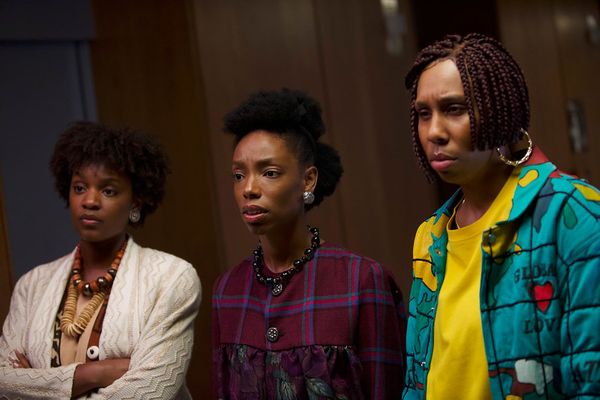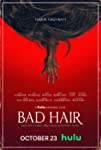Eye For Film >> Movies >> Bad Hair (2020) Film Review
Bad Hair
Reviewed by: Jennie Kermode

From 18th Century New Orleans, where laws were enacted to keep supposedly free Creole women from displaying their natural hair, to 2019, when New York and California led the charge as individual states began to ban race-based hair discrimination, African American women's hair has long been seen as politically contentious. Law is only part of the issue, with a limited ability to influence how things actually play out in competitive workplaces. Following a heroine who is determined to carve out a high profile career and willing to make a few sacrifices if necessary, Bad Hair examines the real world horrors of the prejudice behind all this through the lens of contemporary horror comedy.
Our heroine is Anna (Elle Lorraine), a music programme host who is getting along fine at the studio where she works until her boss is suddenly replaced by a glamorous former supermodel (Vanessa Williams). As a raft of measures are introduced to tone down the cultural blackness of the studio's output, presumably with the aim of drawing in more white or middle class viewers, Anna is firmly told that her natural hair is not acceptable. Some of her friends are ready to leave but she does't want to lose what she's worked hard for. Heading straight for the salon that the boss herself uses, she draws on their shared experience of having to fight for opportunity to persuade a trans woman working there to give her an off-the-books appointment. That done, she gets an off-the-books treatment - a new type of weave that brings massive advantages but at more than just monetary cost.
There's a little-known HP Lovecraft story - one of that author's more overtly racist works, alas, written in collaboration with Zealia Bishop - which tells of an African American woman with vampiric hair, and some scholars have suggested that the Greek monster Medusa (herself originally an ordinary woman who was transformed as a result of a goddess' jealousy) was based on an ancient African goddess whose dreadlocks storytellers associated with snakes. In many parts of Africa, witches are traditionally depicted with streaming locks of hair spread out around them, an image which has recently found its was into East Asian cinema. Director Justin Simien's choices suggest a familiarity with all these predecessors, but Bad Hair has a fresh and volatile statement of its own to make.
Simple but impressive special effects bring Anna's new hair to life in a playful central narrative which begins with cut fingers and soon escalates to levels of violence that Anna din't seem capable of. There's a shyness, a fragility about her despite all the rest, suggesting that every display of toughness has required enormous effort. It's something that makes us (ahem) keep rooting for her as things get ugly, but little hints embedded in the narrative call into question any comforting notion that she's no longer herself. This is, rather, a classic tale about the seductiveness of evil. As it emerges that she too will face a grisly fate if she continues to let the hair get its way, we wonder if she can find a way to free herself from the parasite before it's too late.
Alongside all this is a reflection on the physical pain that black women (and to a lesser extent women generally) put themselves through to meet societal beauty standards, specifically where hair is concerned. The sound design by Michael Babcock is particularly effective in giving that pain a visceral presence in the film. Clever costuming suits the individual characters but also points out the ways in which women at the top of the hierarchy emulate masculine features like big shoulders, in parallel with the imitation of a white-focused straight-haired beauty norm. The physical stress that impacts the characters' psychology stands in for the psychic stress which readers who have not been through this will find harder to get at.
The attainment of privilege brings rewards, and as we see the ways that Anna's life is transformed - the sudden sexual attention she gets where she was overlooked before, the way colleagues perceive her as more skilled and committed, the greater value she places on herself - it's easy to want to celebrate with her. We have, after all, been trained by Hollywood to enjoy such transformations. It's a sneaky way to present Faustian temptation in the modern era. This undercurrent of darker humour balances the silliness of some of the hair attack scenes and ensures that the film succeeds as both horror and comedy whilst having more to say than most of what emerges from either genre.
Reviewed on: 16 Dec 2020

















